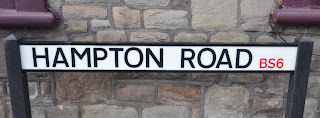Yesterday, 28 February, was RSI Awareness Day. This year,
even for those of us used to working from home, our work routines have been
thrown up in the air and healthy working habits have gone a bit awry. It's also been a fairly reflective sort of
year, so I thought it might be time to talk about some of my pain-related ups
and downs. To explain the past year though, I’m going to have to take you back
a bit …apologies to those who’ve heard some bits of this story before.
1989:
I broke my right collarbone in a car accident. I
was told it'd healed and was sent off to live fairly unbothered by it for the
next 10 years or so.
1999:
After spending my 20s teaching abroad, I’d just
switched to a desk-based job as a lexicographer when I suddenly started getting
severe pains in my right hand, arm, shoulder and neck. I was initially
diagnosed with RSI and after lots of appointments, discovered that my
collarbone had never fixed properly but was wobbling around causing a generally
unstable wonky top right corner and putting all kinds of stresses and strains
on the nerves, tendons and muscles around it.
2000 onwards:
Having had lots of doctors more-or-less
shrug their shoulders, I spent the following 20 years doing my best to live
with increasingly debilitating chronic pain that affected my whole upper body.
It limited my professional life significantly. Having gone freelance early-on
to give me the flexibility to work how and when I could, I worked part-time
hours, was careful not to take on too much and avoided jobs that would be too
fiddly and computer-heavy. I tried various workstation set-ups, took lots of
regular breaks, tried various forms of exercise and therapy.
Late twenty-teens:
By about 2018 though, things seemed to
have hit a real low-point. The pain was getting worse and dominating my life
more and more. I was taking bigger chunks of time off work between projects to recover and my personal life was getting narrower as I avoided more and more everyday situations
that would cause me pain.
June 2019:
A chance comment on a Facebook thread about
mindfulness apps led to a suggestion from Rachael Roberts that I take a look at
Curable, an app aimed specifically at chronic pain sufferers. The results were
pretty dramatic. It feels a bit silly to say that an app managed to ‘cure’ 20
years of pain in just a couple of weeks, but I think it was just the right
thing at the right time and brought together a lot of ideas I’d been aware of
for a while but hadn’t known how to act on. I won't go into the details,
because we’d be here all day, but it basically centred around mindset and my
attitude to pain. It didn’t fix my wonky shoulder, but I learnt how to turn the
volume down on the pain that had started bouncing round my brain’s wiring
out-of-control. I went from taking strong painkillers pretty much daily to maybe
3 or 4 times in 18 months.
Coronatimes:
Despite everything goin on in the world, 2020 on the whole was actually
okay in terms of both my physical and mental health. After a fairly busy few
months in the spring, work dropped off a cliff through the summer and I had 4
months with pretty much no work at all. Of course, it was all a bit worrying,
but thankfully, I got government grants that kept me going financially and the
weather was fabulous! My partner was out of work and being cooped up at home together
wasn’t great, but with the good weather, we could use the garden as an extra
room, there was lots of walking and gardening and we rubbed along fine.
Come the autumn, my work picked up again and I’ve been
more-or-less flat-out since October – which is great, but maybe not so healthy.
As the weather got worse, the days got shorter and my partner got more bored
and despondent, I found myself spending longer stretches at my desk, avoiding
leaving my office for my usual regular breaks because I didn’t want to be
disturbed. By mid-December, I was getting tweaks in my shoulder. I partly put
it down to the cold damp weather, but I knew that too much desk-time and
increasing tension (mental tension leading to physical tension) were to blame too. By the end
of the year, I was exhausted and at the end of my tether with no reserves of
energy to draw on to do the clever, pain-subduing mind trick.
2021:
So far this year has been a tough slog; ploughing on with
work, going out for fewer walks because I’m really feeling the cold in my
joints, and feeling generally resentful and low. Thankfully, I know that I’ve
always struggled with winter and I also know that I usually start perking up in
March, so I’m hopeful that the advent of spring, along with the gradual easing
of lockdown here in the UK will signal an upturn. I’m also just coming to the
end of one work project and it looks like the next project I have pencilled in might
be a bit delayed. So, I’m planning a much-needed week off. Of course, I won’t be
able to go anywhere or do very much, but a bit more walking, perhaps a bit of
pottering in the garden. If I can relax and recharge just a bit, then I think I
can get my priorities back in perspective - even in these weirdly out-of-perspective times - and get my health back on track.
Labels: chronic pain, coronavirus, routine, RSI, work-life balance


































